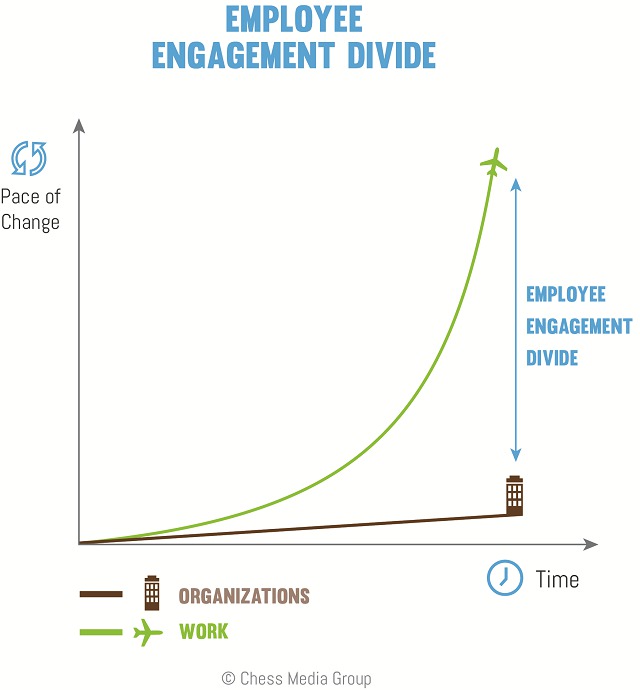We all lead “double lives.” We have our personal lives where we can: control the technologies and devices we want to use, build and shape communities, share and collaborate with who we want where we want, easily access information, take out loans on a house and make purchases, and have the freedom and flexibility to live how we want. Then we have our professional lives where we: commute an hour each way, use company sanctioned technology, sit in cubicles, get 200+ emails a day, are not able to effectively communicate and collaborate, operate under a command and control hierarchy, feel like a cog, and need to get approvals for buying a $100 office chair.
Should we be shocked that synonyms for employee include “cog” or “slave ?” Or that synonyms for managers include “slave-driver” and “zookeeper.” My favorite synonyms are for “work” which include “drudgery” and “daily-grind.” We spend more hours working than doing anything else in our lives so in 2014 and beyond it’s completely unacceptable that we spend the majority of our time on this earth doing things that are beyond our control.
It’s no wonder that the majority of employees around the world don’t like their jobs and there is one key reason for that. Work practices, attitudes, values, strategies, technologies, and ways of working are evolving and changing at a rapid pace, whereas organizations remain stagnant when it comes to adapting to these changes.
We live in 2014 and work in 1970. This gap is what causes employee disengagement.

Many companies still operate as though employees are expendable, assume that managers are powerful leaders who should control all the information and remain stoic, and that there needs to be a bureaucratic “pecking order” to how things get done.
When it comes to the future of work, organizations must focus on closing this gap. Consider an organization such as gaming company Valve which has completely gotten rid of managers altogether in favor of an approach where employees pick what they want to do, who they do it with, and when they do it. Or how about Whirlpool which recently took a unique approach to leadership by stating that everyone at the company should be a leader and created four categories that every employee in the organization can fit into (leaders self, leading others, leading function, and leading enterprise). Then we have organizations like Netflix NFLX which doesn’t have a vacation policy for employees and allows their team members to make their own purchases without having to get approval for everything they need.
Other companies like Unilever are focusing on workplace flexibility; Unilever seeks to have 30% of their 175,000 employee be location independent by 2015. Perhaps one of my favorite examples comes from 1,000+ person company in Canada called Tangerine. Their CEO Peter Aceto has taken a completely unconventional approach to leadership to the point where he actually encourages employees to tell him about their frustrations or what they might not like about working at the company. Peter has also done a tremendous job of embracing vulnerability in the workplace and shedding the traditional robotic manager approach.
We need more companies in the world that acknowledge this gap between how we work how we live. Companies that focus on closing this gap are going to be the ones that attract and retain top talent, build better leaders, and thrive in the new world of work. If your organization doesn’t think about and plan for the future of work, then your organization has no future!
Comments